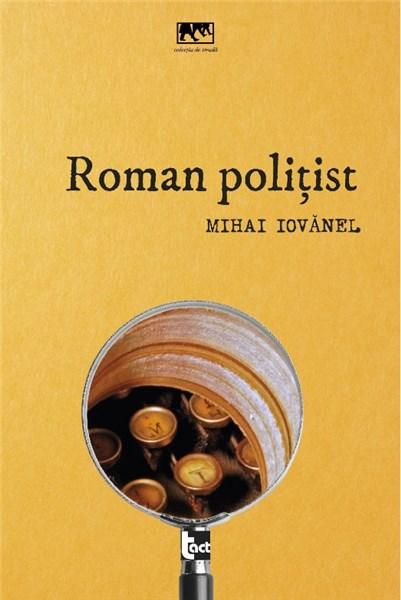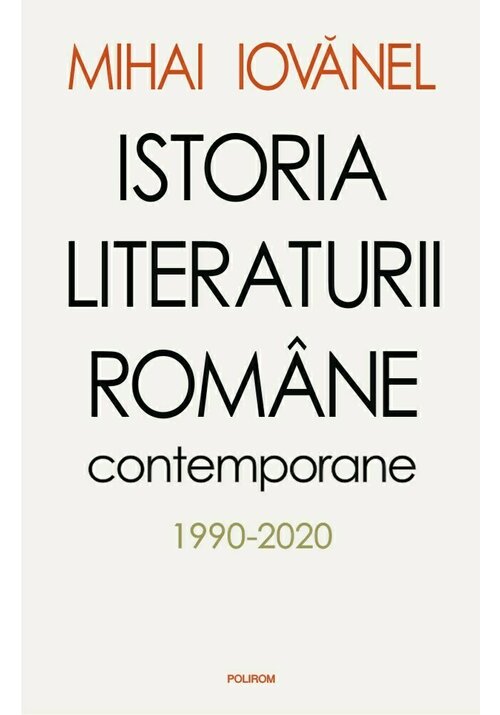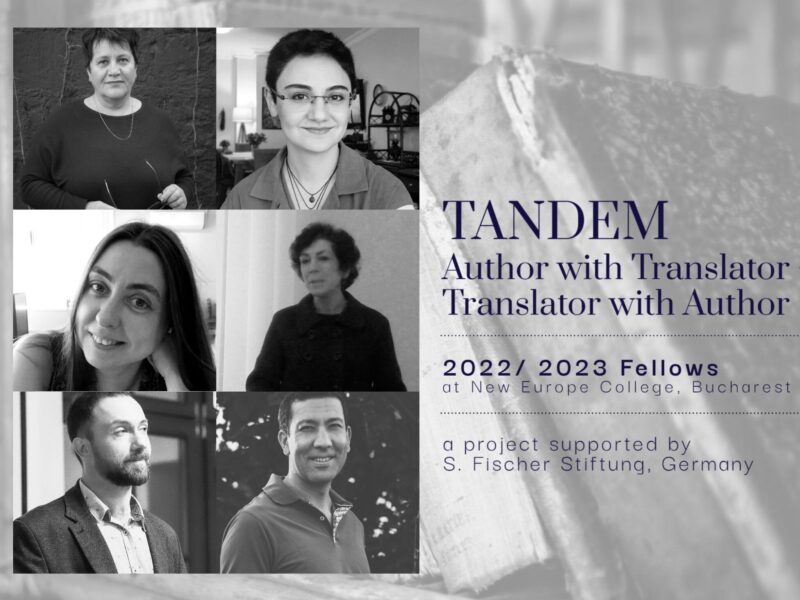Mihai Iovănel is a literary critic and historian. He recently published The History of Romanian Contemporary Literature (1990-2020) (1990-2020)at Polirom Publishing House. Before that he published Ideologiile literaturii în postcomunismul românesc / The Ideologies of the Romanian Post-Communist Literature (Muzeul Literaturii Române Publishing House), Roman polițist / Detective Novel (Tact) and Evreul improbabil. Mihail Sebastian: o monografie ideologică / The Improbable Jew. Mihail Sebastian: An Ideological Monograph (Cartea Românească). He is Senior Researcher at the “G. Călinescu” Institute of Literary History and Theory of the Romanian Academy. Up to 2015 he was an editor at Culturamagazine and for a couple of years he has been collaborating with Scena9.ro, where he writes about the books he likes. Or he dislikes.
You were saying at one point that the ballet between research, academic writing and literary publishing is fragmenting your time and attention. At the same time, it seems that nothing in literary history or contemporary literature escapes you. When do you have time for everything? What does your day as a reader and professional writer look like?
I don’t really have much free time. I stay with my nose in books/tablets/laptop pretty much all the time, which is kind of annoying for my close ones.
You’ve been an editor for 10 years at the Culturamagazine, you’ve had collaborations with Adevărul literar și artistic,among others. You’ve been for a couple of years now part of Scena9’s editorial office, where you write about books and literature in their various forms and genres. How did you choose the books you wrote about back then and how do you do it now?
At Scena9.ro I’m actually a collaborator, I’m not part of the editorial office.
Regarding the book choices, I always had absolute freedom of writing about what I wanted. That doesn’t mean I didn’t receive some very useful suggestions. One of my most read texts on Scena9, 10 traditional families in Romanian literature, was Andra Matzal’s idea.
Did you ever have to write about books you didn’t want to?
No.
In an article on Vice you were talking about how you bought one of the books included on the list of the most controversial titles of last years. You’re one of the most active literary critics – does that put you on the publishing houses’ protocol lists?
I receive books from some publishing houses, but I buy lots of them myself. Because I prefer reading on Kindle (from various reason, beginning with the storage space problem) I often buy the electronic editions of certain books that I’ve already received.
How do you manage the discontent of the contemporaries when, after they eventually offer you their books, you don’t read them fast enough or you don’t write about them?
The most irritating part is when somebody sends a book and then pelts you with texts like “Have you had the chance to take a look on my book?”. As if once I received a book, I also signed a contract and I’m indebted to give the report regarding why I don’t read a specific book. I replied like two times to those messages, but most of the time I ignore them.
What about when you don’t write favorable things about their books, when you “shorten their life with 10 years”, when you “scare off their readers”, the way someone reproached you once?
I don’t really pay attention to those kinds of reactions.
You write for Scena9.ro both literary reviews and synthesis or thematic articles. But you also write literary studies, published in academic reviews or volumes from Romania or abroad. Are the reading and writing tools different?
They’re fundamentally different, even if I do happen to integrate, in rewritten form, fragments from a literary review in a scientific article (or the other way around). There are differences not only from a stylistic and technical point of view (the presence/absence of bibliographies and footnotes), but from many others (the texts for magazines have a limited purpose and a fragmentary existence; they don’t require a coherent/systematic reference to the material).

Does it matter for you how many people read your texts and what the readers’ reactions are?
Yes, but there is a fundamental difference between articles in magazines (where the number of likes/reactions is, so to say, relevant, at least because they contribute to the visibility of the publication) and scholarly texts. The texts I’m most pleased with from everything I’ve written are the ones about Mircea Ivănescu ando Două loturi/Two Lottery Tickets by Caragiale (included in the volume Roman polițist / Detective Novel, 2015); right from the beginning their target group is a small community of readers. In their case, I’m more interested in the quality of their reactions than their number.
You were a member of the jury in multiple literary contests. Are there any objective criteria when notating the nominated texts/volumes or it just depends on the every juror’s taste?
The leeway margin in a jury is always high. That doesn’t mean that the lists of nominations/awards are not okay (although it can happen they aren’t).
What do you think is the importance of the national literary awards in the mechanic of the book market?
The important awards can generate a buzz/visibility for the nominated/awarded books. Maybe even sales. Unfortunately the number of these kinds of awards is not very high in Romania.
You published 3 volumes, each one of them at a different publishing house, and The History of Romanian Contemporary Literature (1990-2020) has recently been published at a different publishing house too, if we take into account that Cartea Românească was an individual entity, administrated only by Polirom. How did you get to collaborate with them and what made you decide to change publishing house?
There have always been various things at stake. For example, in 2012, Cartea Românească was the main publishing house for books on literary criticism. The fact that it was administrated by Polirom was reflected in the quality of the selection, as well as in the visibility of the titles. It would’ve been only normal for me to try there first with my debut volume about Mihail Sebastian. Roman polițist / Detective Novel, a more of a niche book , was published at Tact by virtue of my friendship with Andrei State, with whom I had talked about the project and who supported me. Ideologiile literaturii în postcomunismul românesc / The Ideologies of the Romanian Post-Communist Literature started as a postdoctoral project, a research in progress, of which I was satisfied only from the perspective of what I could’ve obtained in a few years through more in depth research; from this tactical angle, Muzeul Literaturii Române publishing house was an optimal choice. In the meantime, The History of Romanian Contemporary Literature (1990-2020)appeared. I can’t help but be happy it got accepted by Polirom, probably the most important publishing house in Romania.
Were you ever involved in the promotion of your books?
No.
Did you hear back the echoes of the book reviews you wrote, good or bad, when you published yourself the 4 books?
I don’t know. Anyway, I wasn’t paid bills in general.
Ideologiile literaturii în postcomunismul românesc / The Ideologies of the Romanian Post-Communist Literature pictures the evolution of Romanian literature after 1989, connecting it with factors taken very little into account by literary studies: political, social, economical. Considering all of these factors, what do you think are the most important movements on the Romanian book market in the past years, since its publishing in 2017?
The main structural matter, only worsened by the 2020 pandemic, not triggered by it, is represented by the crisis of the physicalbook store. On a small book market, like the Romanian one, bookstores are held in a really strong grip between high rent prices and the need to demand outrageous percentages from book sales (around 50%) from publishing houses. On top of that, the lack of any state subsidies is sentencing them to their doom, in the short-medium run. As much as I love traditional bookstores, I don’t see how they can survive in these circumstances.
In a book review for Roman polițist / Detective Novel, Bogdan-Alexandru Stănescu said that “in a world better than the best of the worlds” the book “would generate heated conversations”. He was blaming the country that “belongs to a more and more superficial and sick world” for the disappearance of these discussions. Coming back to the over structural factors mentioned above, what do you think are the sickness and shallowness of the world?
The main culprit is the government who constantly subfinanced education and culture (and many other more essential domains, like healthcare).
And what would the antidote be?
Money.
At a certain point, an editor was justifying the presence of some “commercial” literature collections by saying that that’s how publishing houses can financially support the “highbrow” authors that they publish. Do you think that on the Romanian book market the commercial vs. high literature dichotomy is still functioning?
It continues to be functional in countries like the United States too, where, although “low” literature has become the object of academic research for a couple of decades now and although this commercial literature has influenced massively mainstream literature, cancelling to a great extent the old artificial opposition between “high” and “low”, there is, to this day, talk about genre vs mainstream.

You took part to the first two volumes of literary studies coordinated (mainly) by Christian Moraru and Andrei Terian, published (or about to be published) at Bloomsbury Publishing from New York. It’s a literary criticism export project, to use Terian’s terms. Who do you think are the most exportable Romanian writers and what do the others lack?
The international market is extremely competitive and I don’t think it’s enough for us to wish to export in order for thing to happen. I can’t say that those authors who’re not translated necessarily lack something. In the case of the translated ones, it’s not rare when personal connections play a role, a thing that has nothing to do with an “impartial” competitiveness (proof in the fact that an insignificant number of exported books get to have a somewhat relevant echo).
Let’s be happy that a writer like Mircea Cărtărescu is extremely well translated, let’s be happy that young authors like Lavinia Braniște begin to be more and more translated. As for the rest, future will tell.
A couple of months ago you posted on Facebook “9 things that bug me about the contemporary ro prose”. Which of the recent authors or read books succeed in dodging all the nine “not like that”s?
Too little time has passed for such a miracle to happen.
Does a 10th thing exist? To make it a round number.
Probably, but nothing comes to my mind.
Although I think you have read and re-read everything that was ever written in Romanian literature (if I were to only mention your contribution to the General Dictionary of Romanian Literature
and at Timeline of the Romanian Literary History), you kept your enthusiasm for good books. At least that’s the impression given by the texts you’re writing. What good book thrilled you lately?
I was exhilarated by the latest novel of Lavinia Braniște. I read its draft; I don’t know when it’s going to be published.
And what’s the one that annoyed you the most?
Better end on a positive/optimistic note: lately I haven’t read books that annoyed me too much.



